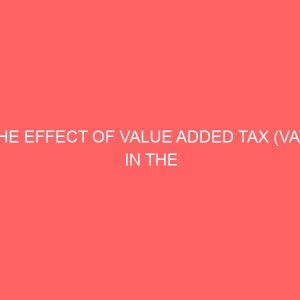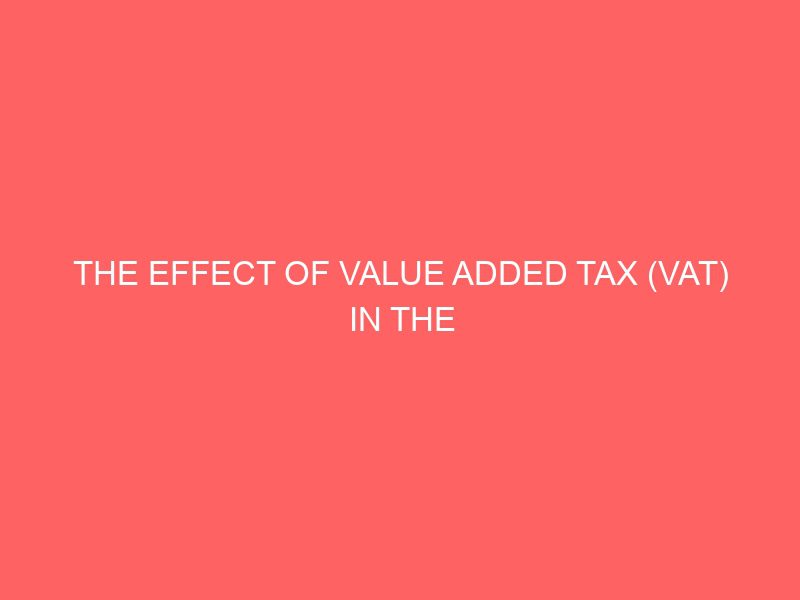Description
THE EFFECT OF VALUE ADDED TAX (VAT) IN THE ECONOMIC DEVELOPMENT OF NIGERIA
ABSTRACT
Value added tax (VAT) have tremendous roles to play in the academic development of the studies have shown that an increase in the number and variety of value added tax plus rise in the proportion of their activities in the course of generating money and other financial asset in the goods and services produced are essential feature of economic development. The development of value added tax scheme is a recent phenomenon in the history of taxation in Nigeria who creation was given in 1940 by the federal government through central bank of Nigeria (CBN). The interesting nature of value added tax has attracted a lot of attention in intellectual disused at seminar, workshop books and research. From a primitive beginning of the industry has grown to a compel level by which it has assume a significant position in the management of taxation of Nigeria in 1940, taxation function has being more and more defined. However, the efficiency and effectiveness of value added tax is as well as the operation in every community as compulsory levy. It is in the realization of this unique place which accounting information has in the management decision making of FIRS at Abuja. The aim of this project was to determine the extent of demand financial asset in the goods and services. To realize the aim of this study, both primary and secondary data were collected, presented and analysed. This test involved the use and the development of Nigeria economic in the percentage from the analyses the study established the identification of medium and long – term goal based on the value added tax.
CHAPTER ONE
INTRODUCTION
1.1 BACKGROUND OF THE STUDY
A tax is a compulsory levy imposed by the government on individual and business firm such levies are for example made on income (consisting of salaries, capital transfer, business profit) etc.
Taxation in Nigeria has been in existence even before the coming of the British colonial masters, but they were informing of tributes to or labour for community work.
Lugard established the European form of taxation in 1904; this was followed by nature revenue ordinance of 1914, while the first tax legislation on adult was enacted in 1939, which began in 1940.
Value added tax is a tax on consumption which is borne by the final consumer because it include in the price paid of goods and services presently, it has a rate of five percent (5%) of Consumption and thus the federal inland Revenue service in vested with this power to collect it.
The new Webster’s dictionary of the English language international edition defined tax as “a charge on a person’s income or property”, direct tax or on the price of good sold, indirect tax made by a government to collect revenue. From the above, tax could be seen as a compulsory levy imposed by the government through its agents on citizen, consumption capital expenditures and income for the purpose of generating revenue for governmental use.
Taxation is the concept and science of imposing tax on citizens consumption etc. value added tax is a tax imposed by the government on citizens on the consumption of goods and services by the citizens.
Value added tax was introduced in Nigeria in 1993 by decree number 102 of 24thAugust 1993, but by administrative arrangement invoicing for the tax purpose did not commence until 1st January 1994. The decision to introduce vat in Nigeria has been made easy for the government by the pallid state of our economy which was caused by Nigeria overdependence on oil revenue which does not make for economy stability, since it makes her fortunes depends almost exclusively on the international price of oil which is not under control. According to Okpe (2001). Value Added Tax is one of the means of raising additional non – oil revenue locally, and to replace the existing sales. Tax Degree No. 7 of 1986 which was a poor internal revenue generating tool for the states, the introduction of Bay was suggested to the federal government. This idea of VAT started with the acceptance of the recommendation of Dr. Sylvester Ugoh led study group on indirect taxation in November 1991. The decision to accept the recommendation was made public in 1992, budget speech. Okpe also added that, to further the tax reforms, the federal government set up two tax study groups in 1991; one was set up by the federal ministry of finance and economic development to study and make recommendation on the reforms needed in the direct taxes in Nigeria. The other study group on indirect taxation was set up by the federal ministry of budget and planning. This study group he said was inaugurated on the 26th of April, 1991, by the honourable minister of budget and planning. Okpe (2001) also observed that the working objectives of the group are among other things to:
- Shift taxation on consumption rather saving direct
- Reduce dependence on oil (petroleum) revenue
- Provide incentives for export production
- Improve the administration of indirect taxes
- Maintain a fairly and even tax incidence across various lines, stages and element of production including non – productive element of taxation on imported goods. It was this committee that gave the general guideline for the establishment of a value added tax in Nigeria and its administration was given a Federal Inland Revenue Service which was already charged with the responsibility of administering most other taxes in Nigeria.
1.2 STATEMENT OF THE PROBLEMS
Whenever there is a new policy, it is bound to face the problem of acceptance by the public as well as the problem of it implementation. There is a problem of what is VAT by the general public, business organization and the final consumers.
1.3 OBJECTIVE OF THE STUDY
The objective of the study include:-
- Improving operational efficiency of value added tax (VAT administration.
- Identifying effect of value added tax (VAT) to the Nigeria economy
- Finding out the extent to which operation of (VAT) comply with the (VAT) laws.
- Finding out the problem facing tax administration with particular reference to value added tax (VAT).
- Evaluating the performance of value added tax (VAT) in relation to the Nigeria economy
- Finally the research will make suggestion and recommendation based on the findings.
1.4 RESEARCH QUESTIONS
- How do you improve the operational efficiency of value added tax (VAT) administration
- What are the effects of value added tax (VAT) to the Nigeria economy?
- Does the operation of VAT comply with the Value added Tax law in Nigeria?
- What are the problems facing tax administration in Nigeria?
- What are the impacts of value added tax (VAT) in relation to the Nigeria economy?
1.5 RESEARCH HYPOTHESIS
Ho: Value Added Tax (VAT) is not improving the Nigerian economy.
Hi: Value Added Tax (VAT) is improving the Nigerian economy.
1.6 SIGNIFICANCE OF THE STUDY
Today our economy growth rate has slowed down considerably and jobs for university and polytechnic graduate are no longer available due to the world economic crises.
The Nigeria government have realized the importance of diversifying her source of revenue generation from the sole dependence on crude oil to several other means of generating revenue for its expenses. Therefore Value Added Tax (VAT) becomes a viable alternative for revenue generation to the country.
Therefore this work will be of great importance to the government of Nigeria as it will discuss in details the effect of value added tax (VAT) in the economic development of Nigeria. It will enables law maker to enact laws that will favour the enforcement and collection of value added tax (VAT) and tax in general from the appropriate individuals and organizations.
This research work will also be of benefits to the Federal Inland Revenue Service (FIRS) Abuja as it will discuss issues that affects the administration of Value Added Tax in Nigeria, this will helps overcome unfavourable factors that affects the administration of VAT.
Finally, the research will be of great significance to researchers and students who will want to research and improve the knowledge on the effects of value added tax as it will serves as reference material.
1.7 LIMITATION OF THE STUDY
In carrying out this research, the researcher encounters a lot of problems which limits the scope of this research to the effect of value added tax (VAT) in the economic development of Nigeria. Among such problems are the uncooperative attitudes of the respondents. This happens when the researcher visits the study area and the respondents were very reluctant and unconcerned in answering the research questions. However the researcher was able to convince them to answer the research questions which were of importance to this work.
1.8 SCOPE OF THE STUDY
The scope of this study is to examine the effect of Value Added Tax (VA) in economic development of Nigeria. However, due to time and financial constraint, the scope of this research will only be limited to Federal Inland Revenue Service (FIRS) Abuja.
1.9 DEFINITION OF TERMS
TAX LIABILITY: – This is the total value added tax payable by the taxpayer after deducting tax credit, withholding tax.
SELF ASSESSMENT: – Assessment is the basis of taxable income in respect to self-employed persons and partnership; it is based on estimation and return filled by tax payer.
P.A.Y.E:- Payee means pay as you earn. It is a scheme where income taxes and wages and salaries in a relevant tax year are deducted at source by employers who pay same to revenue service.








Reviews
There are no reviews yet.